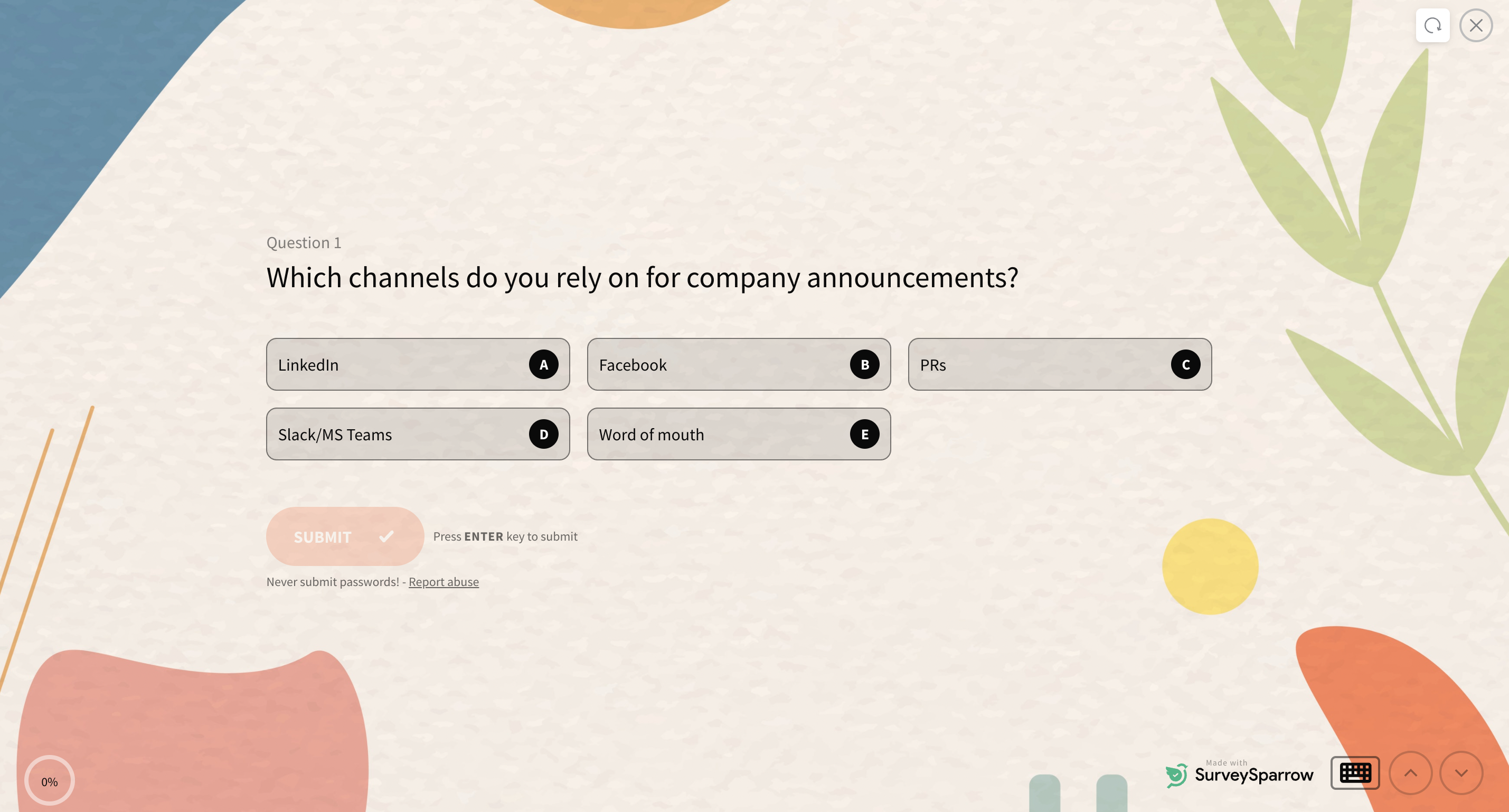Employee Experience
7 Important Internal Communication Survey Questions
Article written by Kate Williams
Product Marketing Manager at SurveySparrow
12 min read
19 September 2025

60 Seconds Summary:
Let's understand the value of internal communication surveys for identifying gaps and improving information flow within organizations. There are seven key questions to assess how employees receive updates, the effectiveness of managerial and team communication, awareness of company goals, engagement, and preferred communication channels. Understanding these areas helps organizations boost transparency, alignment, and morale. Regular, well-crafted surveys are essential tools for building a more engaged and productive workplace.
Are you looking for the best internal communication survey questions?
Employees are the backbone of any organization. Often, companies suffer from not paying enough attention to their employees.
For example: Do your employees know what your company’s goals are? Are they deeply involved in helping the company reach those goals?
And that’s why well-devised internal communication survey questions can help you learn that and much more.
Also, before we get into the business, I have for you a beautiful internal communication questionnaire that you can make all yours.
Just sign up with your email, tweak the content and design the way you want and use it as your company’s brand new internal communications cop!
Internal Communication Survey Template
Use This TemplateThe 7 Most Important Internal Communication Survey Questions
To ask effective questions in a survey is an art. There are many places we can go wrong.
To get good quality data from an internal communication survey, make sure you’re only asking the most important questions. Here are the 7 best internal communication survey questions to ask.
- How do you currently get information about the company?
- How much effort does your direct manager make to keep you informed?
- Does your team assist you to complete your work?
- How would you rate your knowledge of the company’s goals?
- Do you care about the future of your organization?
- Do you feel like the company listens to your concerns?
- How do you prefer to get the information about the company?
1. How do you currently get information about the company?
Great content won’t make an impact if it’s shared on the wrong channel. So the first goal of the internal communication survey is to pinpoint current communication channels.
How are your employees getting information about the company? Before anything else, internal communication survey questions should help you find this out.
The fact is, you already have some communication channels in place. So your internal communications survey will help you find out your employees’ current sources of information.

Sign up here to create similar internal communication surveys 🙂
14-day free trial • Cancel Anytime • No Credit Card Required • No Strings Attached
Some of the other internal survey questions include:
- Do they discuss these with their managers?
- How often do they read the company newsletter?
- Where do they discuss work projects and share briefs?
And so on. What if you want to probe a particular internal communications channel? You can make it more specific.
For example, how many employees read the company newsletter, how many feel it’s worthy of sharing, and so on. The goal is the same: find out which channels are working.
2. How much effort does your direct manager make to keep you informed?
There is no doubt that digital efforts enhance internal communications. But nothing can replace the human touch of a manager.
For employees, the best channel for knowing about the company is their manager. It is crucial for your internal communication survey to find out whether that’s happening.
For the most accurate response to this question, the answer is best framed as a rating between 1 to 5.
In your set of internal communication survey questions, this particular question does more than just give reliable data.
It also shows employees and managers that this is a priority. The whole team becomes conscious that managers should keep employees informed. Having such questions is a great way to communicate your company’s priorities in a subtle manner.
3. Does your team assist you to complete your work?
A big chunk of internal communications is collaboration. If an employee is feeling isolated, that is not a great sign. A company should bring teams together so they can learn from each other. This question helps you find out whether that’s happening.
You can use multiple-choice questions for better clarity. Aside from the written responses, there are some obvious physical cues when an employee feels like part of a team, and when they don’t.
If they are openly collaborating with peers and seeking help, that’s a sign of good communication. A good internal communication survey must find out whether that’s happening. If you find out that it’s not, that means it’s time for some team-building activities.
4. How would you rate your knowledge of the company’s goals?
This is perhaps the most-asked question in an internal communications survey. We can spend hours strategizing at the C-suite level – but in the end, it all comes down to what the employee decides to retain.
This question is a self-assessment. Instead of testing how much an employee actually knows, rather, it tests how much employees feel like they know. This is a better metric because feeling valued is more important for a productive, happy employee.
This question will help you gauge how far along you are in your communications strategy. It will also make your employees conscious of their levels of knowledge. That’s never a bad thing!
5. Do you care about the future of your organization?
The knee-jerk answer is ‘Of course’ — but you want an honest response.
The fact is, all good managers know how important this question is. Employees will only stay motivated if they care about the future of the company. We could even say that all internal communication efforts are aimed at this goal.
But do they truly care? This question will help you find out.
An internal communications survey is simply a tool to find out how your employees feel. If they’re demotivated and don’t care about the company, you should know. If they feel that they’re a part of a team, you should know. So don’t be afraid of asking bold questions.
Having a question like this in your internal communications survey shows that you’re open to the employee’s honest opinion. It can help employees feel that their organization is listening, and that means a lot.
Communicate until it starts to feel like you’re over-communicating. https://t.co/U6tBxHu2lo
— PRNEWS (@PRNews) August 22, 2021
6. Do you feel like the company listens to your concerns?
Till now, we’ve asked questions about whether employees are receiving information. A well-rounded internal communications survey also asks if communication is happening the other way around. Are managers listening to employees’ concerns?
A communication strategy to keep employees informed is essential. It is as important, however, to have a strategy to listen to them. Companies that don’t listen to employees create a discouraging work atmosphere. So it is essential to find out if your employees feel like your company is listening.
The internal communications survey itself is, of course, part of the company listening. But it doesn’t end there. You must also take employee feedback seriously and make changes accordingly. Communications can only go so far if there is no real impact. Companies that want to retain their talent must make their employees feel heard.
7. How do you prefer to get the information about the company?
The point of this whole survey is to find out how to communicate better. So, your safest bet is to ask your employees directly.
How do they prefer to get important information? Do they prefer team meetings where they can openly discuss their thoughts? Or would they rather just receive an email or Slack or (gasp!) a chat message?
This question can be framed as a checklist or a text box. Employees can then point out the channel that feels the most effective to them. You can use this data to design a communication strategy that takes your employees’ preferences into account.
An overwhelming majority of your employees might abhor team meetings. Or they might feel the need for more meetings to voice their thoughts. Either way, this internal communication survey question will keep you in the know.

Create conversational surveys with Surveysparrow!
A personalized walkthrough by our experts. No strings attached!
Why You Should Conduct An Internal Communications Survey?
An internal communications questionnaire is vital for a company’s communication strategy. But a good strategy understands the needs it is addressing.
Any workplace that cares about its employees must have an internal communication survey. Here’s why:
- They help you identify weaknesses: You can choose to spend large sums on hiring consultants to improve your communications strategy. Or you can do the simpler, more cost-effective thing and ask your employees. Analyzing the results of the internal communications survey will give you a strong base to improve your company’s strategy.
- Surveys give employees a voice: Ineffective communications can make them feel like they don’t have a say in the company’s decisions. This is how employee engagement drops. That’s why companies need to give employees a channel to express their feelings.
This can be more important than you think. A Salesforce study recently found that employees who feel heard at work are 4.6 times more likely to give their best performance.
Now that we understand why internal communication surveys are important, let’s get to the questions you need to ask.
3 Tips for Conducting An Effective Internal Communications Survey
Now that we have our internal communication survey questions, let’s check out a few tips to make it effective. After all, designing the questions is only part of the challenge. We must also ensure that employees respond and that the results are accurate. Here are a few do’s and don’ts to help you along the way.
1. Keep it Anonymous
We don’t want to know what specific individuals think – that misses the point altogether. We want to find out how informed and valued employees feel. For them to answer honestly, the burden of personal identity needs to be taken away. They should feel free to answer without judgment.
For an internal communications survey, anonymity is essential. Employees should feel comfortable expressing concerns about their managers. They should also feel okay admitting they don’t know much about the company. So while sharing the survey, make sure to mention that it’s anonymous.
2. Run A Sample Survey with a Focus Group
It can be helpful to get employee feedback on the survey itself. Share your survey with a small set of employees before sending it out to the whole organization. This way, you can root out small mistakes and vague questions.
After all, the last thing you want is to get unhelpful data due to errors that can be easily fixed. A focus group can tell you when they feel like the internal communication survey questions are unclear.
3. Follow Up On Your Survey
I cannot emphasize this enough – follow up on the results of your internal communications survey. If the results show problem areas, assign people to fix the problems. If a particular team is shown to be communicating well, let them know. It’s paramount for the employees to know that the survey isn’t just a formality.
Any effect the survey itself has on making employees feel heard is dependent on them actually being heard. Be open about the changes you’re making after the internal communications survey, and put it into visible action. Rest assured that your employees will become a lot more responsive to future surveys.
Wrapping Up
Healthy internal communication habits lead to productive workplaces. The best way to make sure your organization is on track is to conduct regular internal communication surveys.
The best internal communication survey questions are the ones that address a company’s most pressing needs. Problems that are not clearly visible might come up in these surveys. You can then use the results to beat challenges and maintain a healthy workplace.
The best surveys are anonymous, have clear and bold questions, and make employees feel heard. They are the drivers of an effective internal communications strategy. Getting it right isn’t hard, and the results are worth it: motivated employees and collaborative teams.

Get upto 40% more responses on your employee surveys. Start your free trial today!
Kate Williams
Excels in empowering visionary companies through storytelling and strategic go-to-market planning. With extensive experience in product marketing and customer experience management, she is an accomplished author, podcast host, and mentor, sharing her expertise across diverse platforms and audiences.
Frequently Asked Questions (FAQs)
An internal communication survey is a tool used by organizations to gather feedback from employees about how information is shared, received, and understood within the company. It helps identify strengths and areas for improvement in communication practices.
These surveys help organizations:
- Uncover communication gaps and bottlenecks
- Assess the effectiveness of managerial and team communication
- Ensure employees are aligned with company goals
- Boost transparency, engagement, and morale
Effective surveys typically ask about:
- How employees receive updates
- The clarity and frequency of communication from managers
- Team collaboration and support
- Awareness of company objectives
- Preferred communication channels
Regular surveys—such as annually or biannually—help organizations track progress, adapt strategies, and maintain open lines of communication.
Related Articles

Employee Experience
10 Employee Retention Strategies That Matter
11 MINUTES
26 July 2018

Employee Experience
75+ Performance Review Questions for Employees, Managers and Sales Teams
12 MINUTES
13 June 2022

Employee Experience
What is Performance Appraisal | Performance Review
12 MINUTES
12 January 2021

Employee Experience
How To Create An Effective Employee Engagement Action Plan
10 MINUTES
22 October 2021
